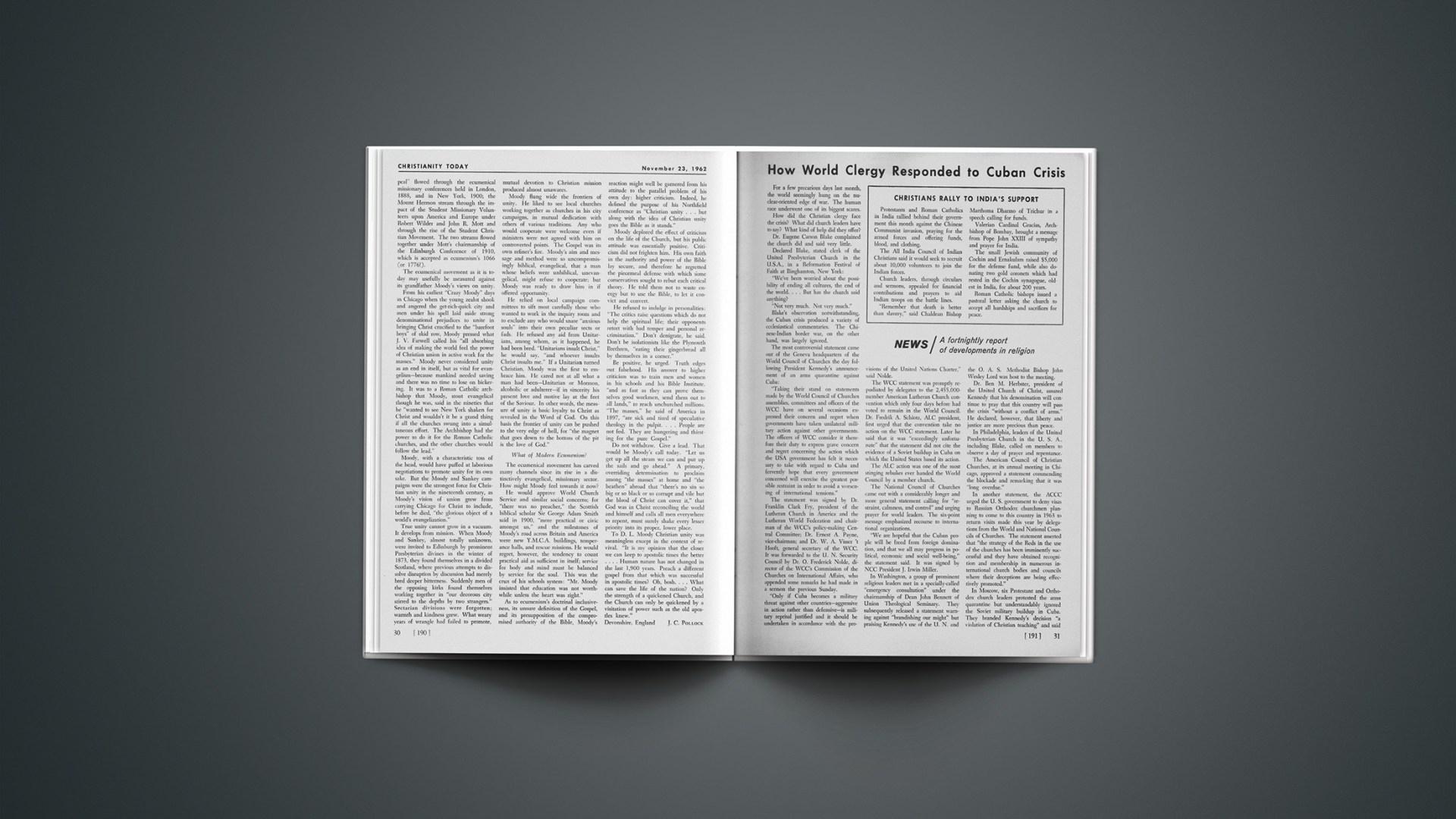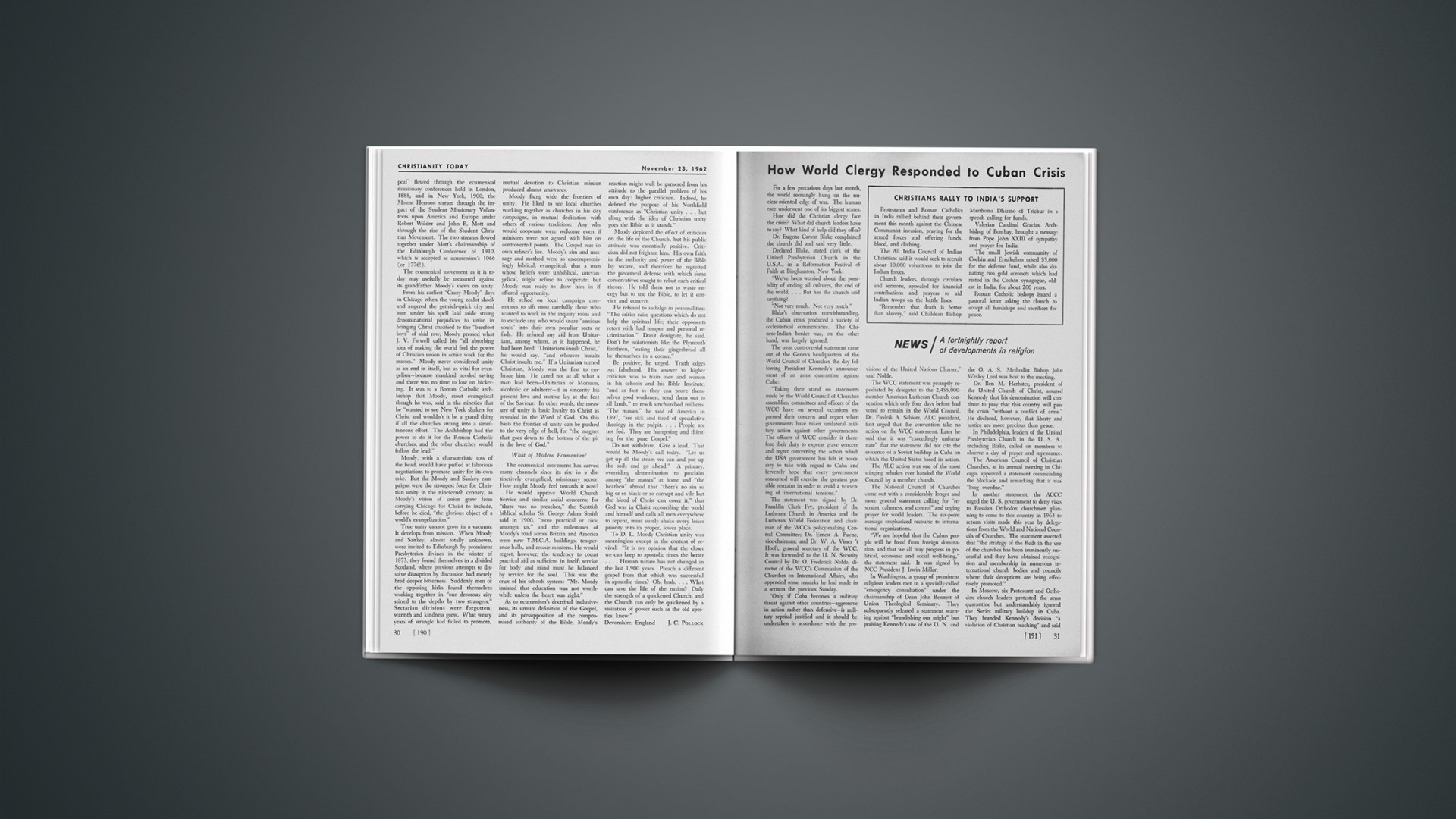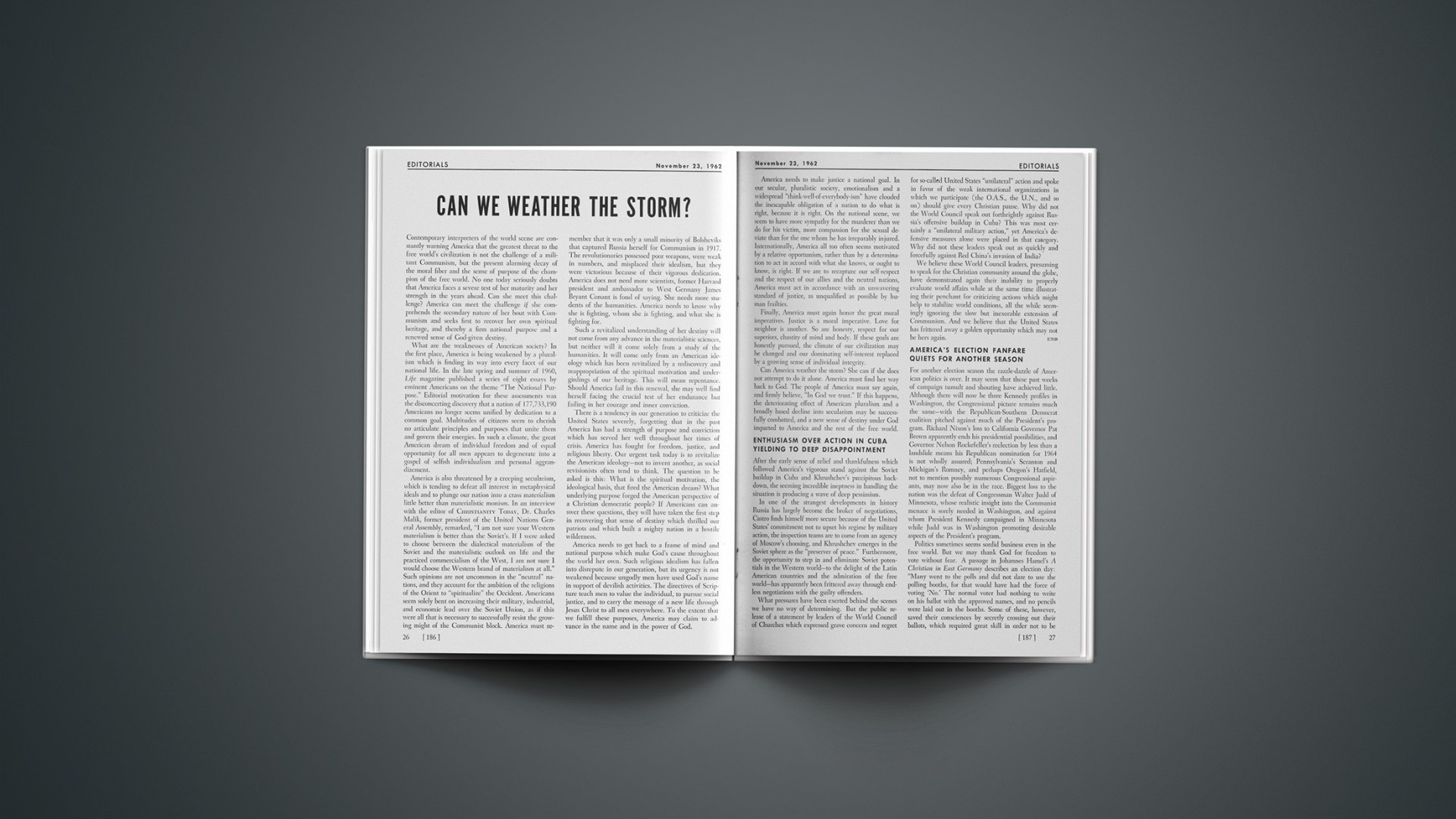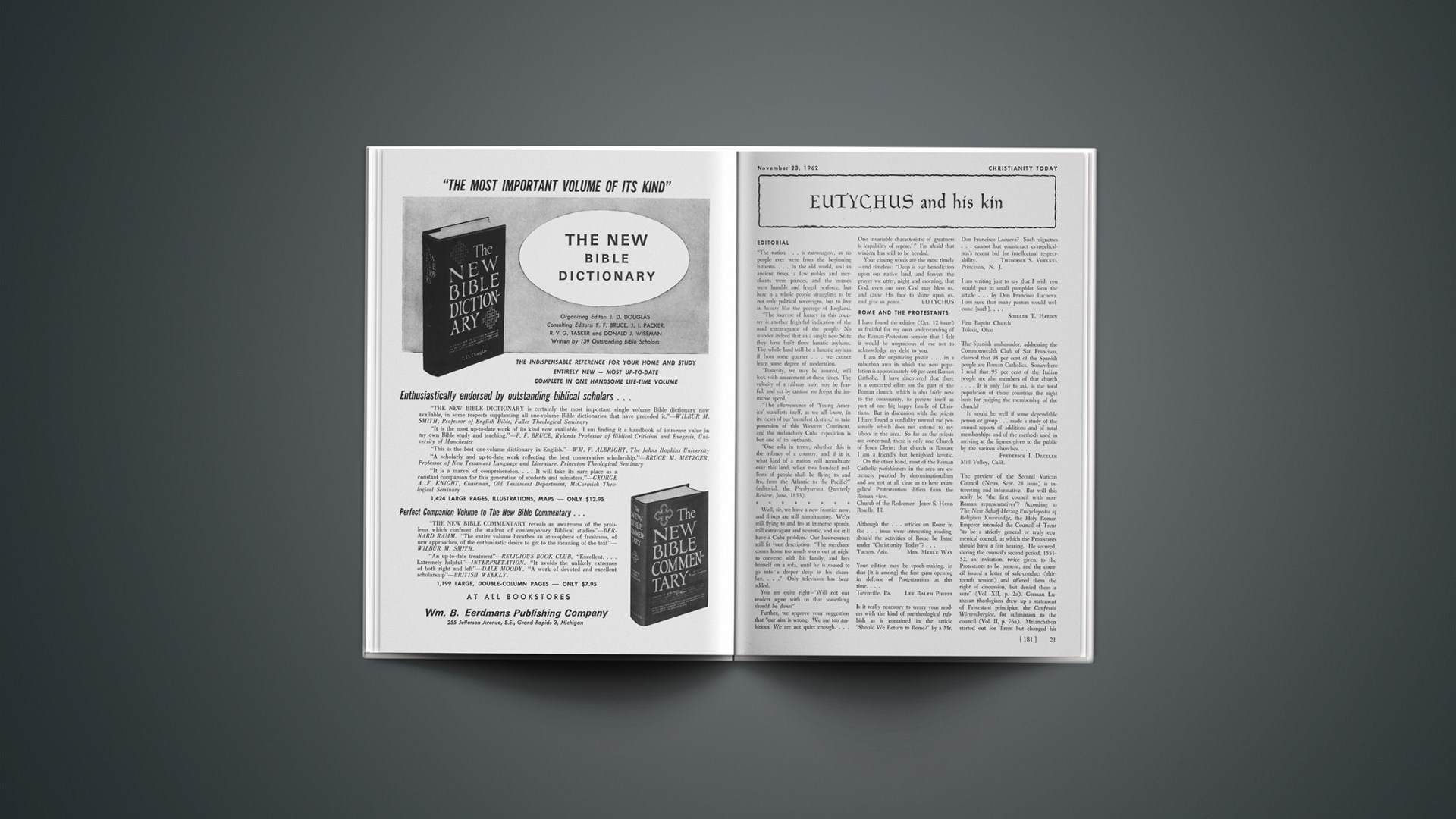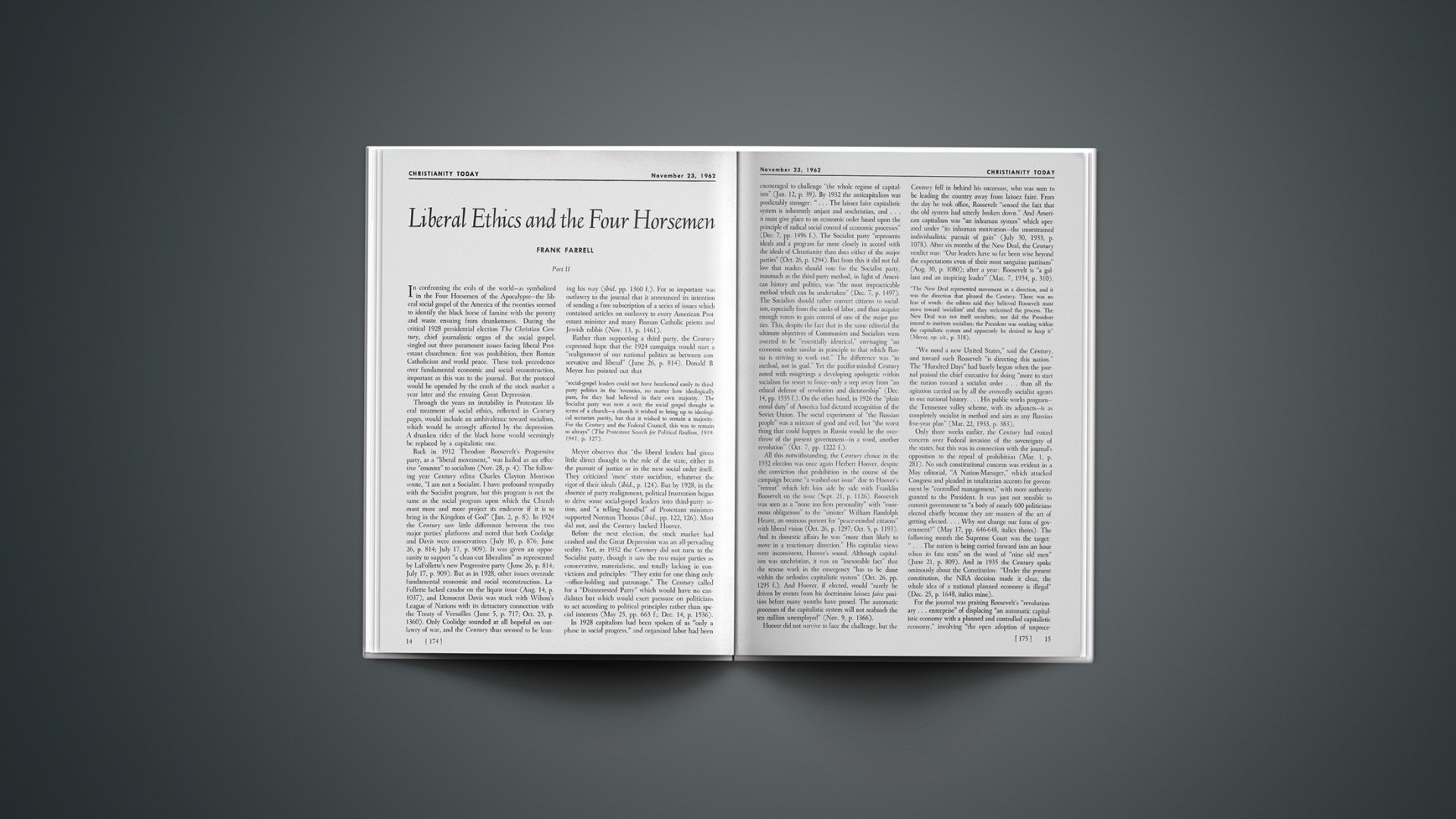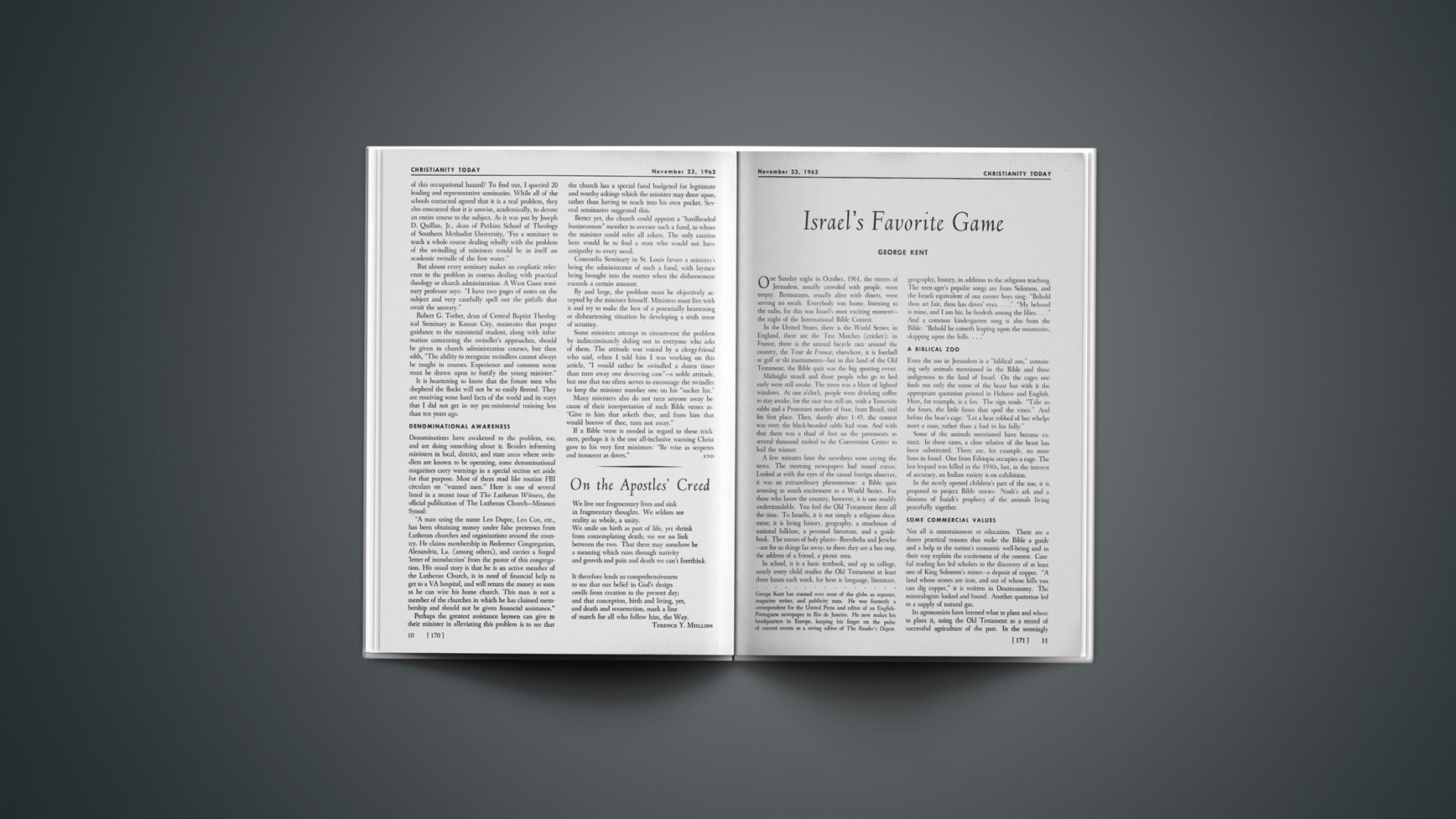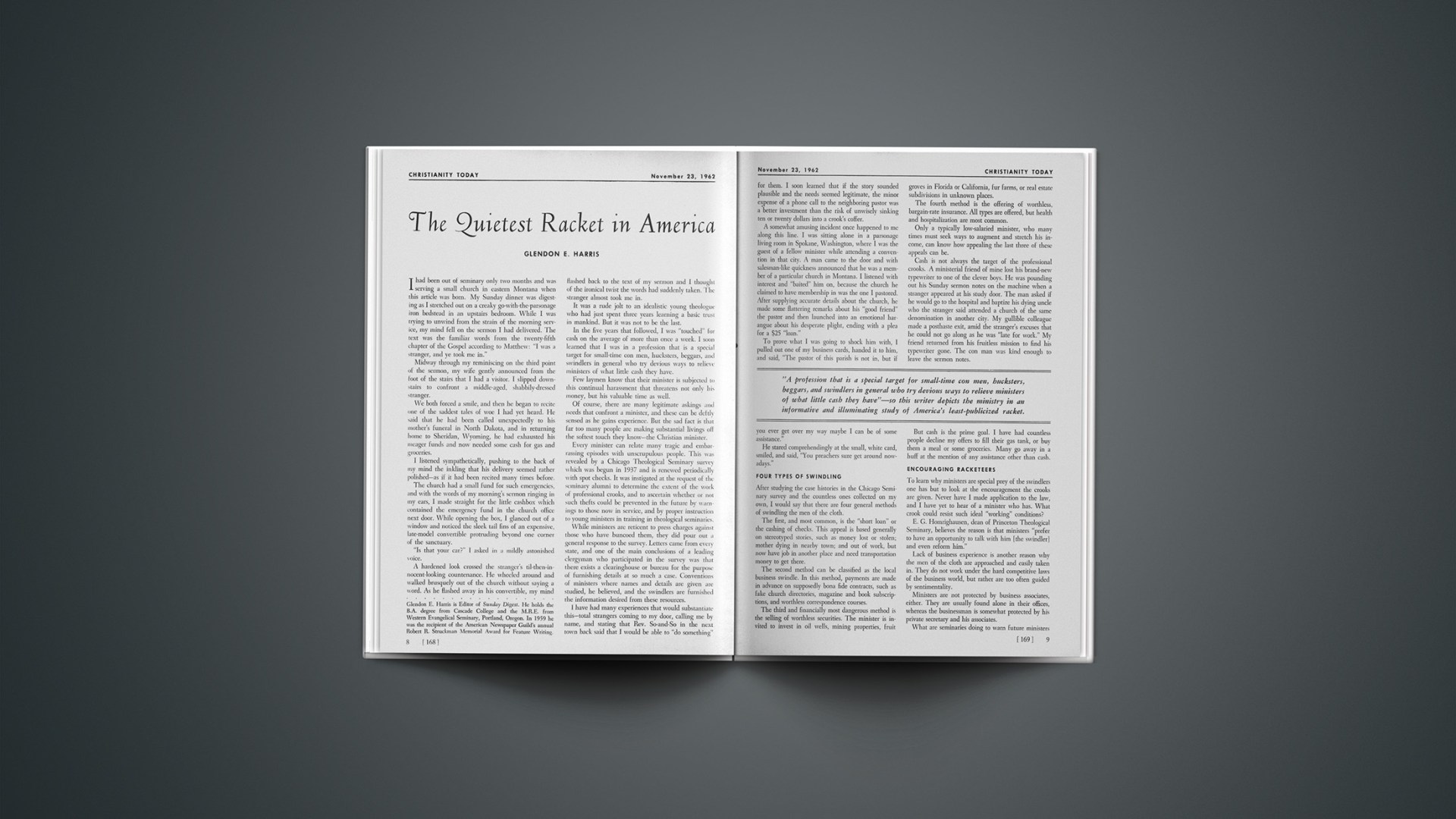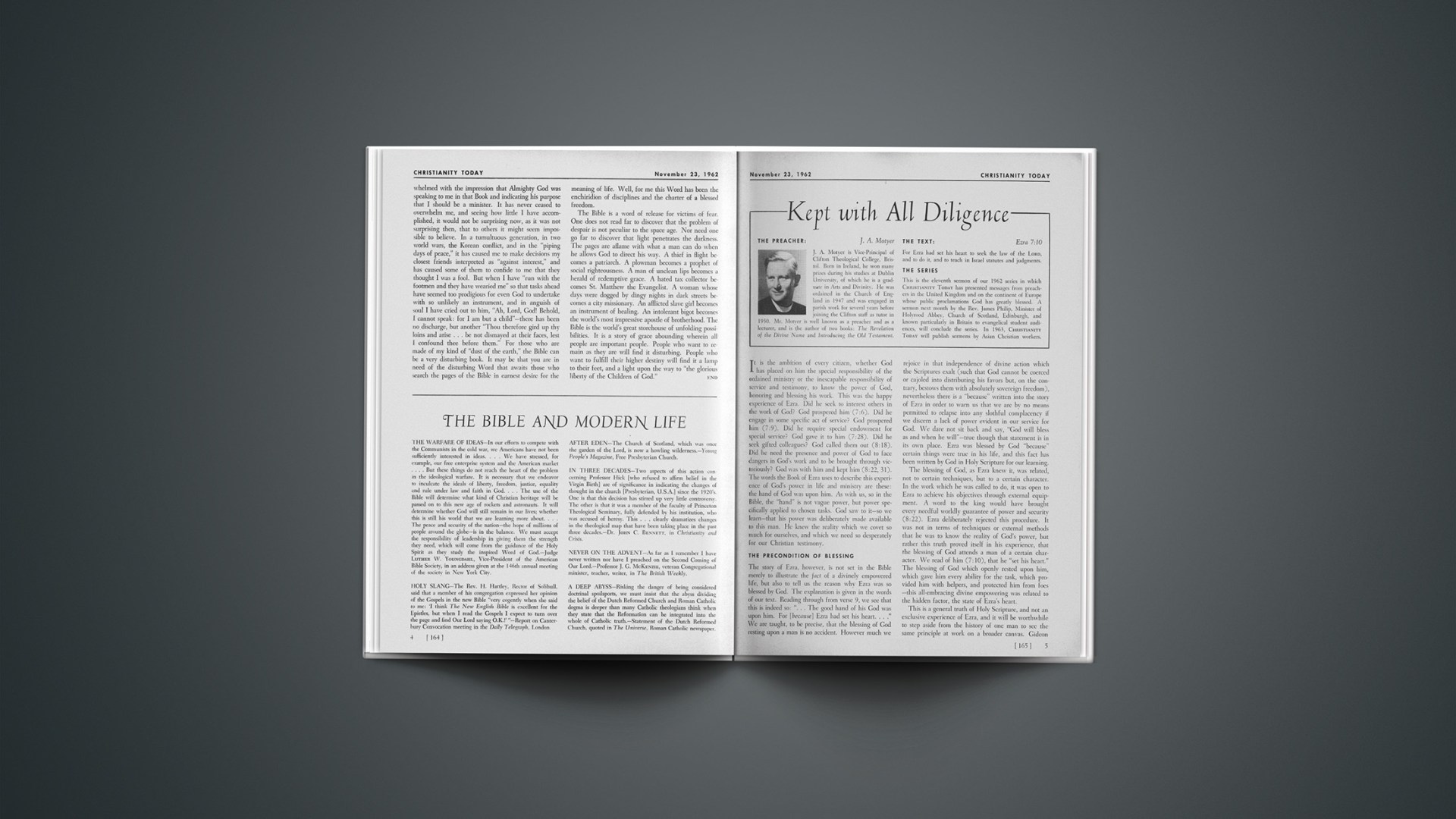Columbus landed in America with a theological thud that introduced Catholicism to the new world. Exactly 470 years later, in October, 1962, arms-laden flotillas were retracing his route and churning up a world crisis. Meanwhile, 4,000 miles to the south, the foremost evangelist of the twentieth century was reintroducing Christianity to South America in the spirit of the Protestant Reformation and on an evangelistic scale hitherto unparalleled.
The week of the big war scare found Billy Graham in the climactic event of his second Latin American tour of 1962: an eight-day crusade in sprawling Buenos Aires, one of the world’s ten largest cities. Warm spring evenings saw turnouts of 20,000 eclipsing the nightly average of Graham’s gigantic 1957 crusade in Madison Square Garden. Hour-long telecasts gave entrée to the Gospel in hundreds of thousands of nominally Roman Catholic homes in Argentina and Uruguay.
Graham made appropriate references to the crisis, but carefully avoided exploitation of fear. To a crowd of some 50,000 gathered for the closing service at San Lorenzo soccer stadium, he said:
“The problems of peace are sometimes greater than the problems of war.”
At about the same hour that President Kennedy was delivering his arms quarantine address, Graham, unaware of the momentary gravity of the international situation, was announcing his sermon topic for the following evening: “The End of the World.”
The next day he told a group of Southern Baptists that word of the blockade came as no surprise to him. He indicated support of Kennedy’s action and disputed philosopher Bertrand Russell’s statement that “we may all be dead in a week.”
“We will not all be dead in a week, or a year, or ten years,” Graham declared. “We may have war, but God has other plans for the universe.”
Graham repeated the observation that night at Luna Park boxing arena, largest auditorium in the city, and subsequently on television. He cited biblical predictions of widespread fear and sudden destruction.
“But the Bible teaches that before man destroys himself, Christ will return and his kingdom will ultimately prevail,” Graham added.
The basic problems of the world, he said, are spiritual. He urged Christians to intensify their efforts in spreading the Gospel, to exert leadership in such times of crisis, and to pray for world leaders. He suggested that the United Nations break precedent by calling delegates to prayer.
Some had feared that Graham would be subjected to anti-American demonstrations in view of the crisis. But they never came off. Would-be demonstrators may have been discouraged by the large contingents of police assigned to the arena. During one rally, five black-helmeted officers guarded the entrance to the platform. At the first of two weekend meetings held in the outdoor stadium, 40 policemen were on hand, probably because the previous night had seen a pro-Castro demonstration just nine blocks from Luna Park. Police used tear gas and fired shots into the air to disperse downtown mobs that night, and 19 persons were arrested.
The overwhelming majority of the population welcomed Graham and his team wholeheartedly. The only thing resembling an incident occurred when a young tough beat the window of Graham’s car with his fist. Once during the week a note was thrown into another car carrying team members. It read:
“For God’s sake, stop the blockade.”
For years, missionaries to Latin America have been predicting a showdown there with worldwide impact. Few guessed it would come out of Cuba. Some mission leaders now have reason to regret that they did not take Cuba more seriously during the years of opportunity. They now realize that the island nation constituted their nearest foreign mission field, yet was neglected.
Graham himself has preached only once in Cuba—to a crowd of 500 at Camaguey. On the other hand, Protestant mass meetings have only recently become realistic possibilities in Roman Catholic lands. It is doubtful that Graham’s reception into South America would have been as successful two or more years ago. In January and February he conducted crusades in Venezuela, Colombia, Ecuador, and Peru. In September and October he spoke in Brazil, Argentina, Paraguay, and Uruguay. Together he and his team addressed an aggregate of more than 750,000. More than 20,000 of these made public commitments to Christ.
Graham has yet to visit Bolivia and British Guiana, which threatens to be another Cuba on the South American continent. He cancelled tentative services in Georgetown, British Guiana, and another in Recife, Brazil, but hopes to place both on next year’s schedule.
The evangelist took particular note of the Cuba crisis through the perspective of his own travels during the last decade. In a talk to team members, Graham noted that the Buenos Aires crusade concluded a long-range tour of the accessible world. He and his team have now conducted crusades in every major area of the free world.1Graham has conducted campaigns in five of what the National Geographic Society considers to be the ten largest cities in the world: London, New York, Sao Paulo, Buenos Aires, and Chicago. He goes to Tokyo, the biggest, next spring. The other four: Shanghai, Moscow, Bombay, and Peiping. A Far East tour scheduled for next spring will initiate a second time around.
Looking back, it was clear that this had been the opportune year for evangelistic penetrations into South America. Roman Catholic opposition was sporadic. Organized hostility was unthinkable in the ecumenical climate of 1962. Moreover, the latter part of the crusade probably was enhanced by the fact that the hierarchy was in Rome.
Graham’s severest rebuke came in Asunción, Paraguay, where he encountered a boycott by the press and a competing Roman Catholic festival. By contrast, a high-ranking Roman Catholic prelate visited Graham in São Paulo and said he was encouraging people to attend the crusade.
The political climate also favored evangelistic endeavor. Graham paid personal calls on four heads of state: in Argentina, Paraguay, Chile, and Ecuador. As he does at every such occasion the evangelist gave the account of his own conversion to each.
The crusade in Buenos Aires was the longest and probably had the greatest overall impact, although Graham said he felt the response in São Paulo was more marked.
Despite his weariness, the evangelist’s health held up well. A flu attack felled him in Rosario, Argentina, however, causing cancellation of one of his rally appearances there. A recurrence of the illness confined him to bed for two days in Miami following the crusade.
Graham’s Spanish translator was the Rev. Paul C. Sorensen, missionary of the Pentecostal Assemblies of Canada. Sorensen spoke with Graham at every point on the second tour except São Paulo, where the Rev. Walter Kaschel interpreted the messages into Portuguese. A highlight of the São Paulo crusade for Brazilian evangelicals was the announcement of the nation’s first Christian radio station, dubbed PRA-7 and owned by the Christian Cultural Corporation of Brazil and World Gospel Crusades.
Comprehensive and authoritative statistics are hard to come by, but there are believed to be at least 500,000 Protestants in Argentina’s population of 21,000,000. Plymouth Brethren are the most numerous of Protestants, followed by Southern Baptists, Methodists, Lutherans, Pentecostals, and a wide assortment of other groups. At last count there were 432 Protestant missionaries at work in Argentina, most of them organizationally subordinate to nationals.
The Argentines take great pride in their culture and point to their opera houses and universities as being among the largest in the world (there is virtually no illiteracy). Some Argentine evangelicals feel that the caliber of incoming missionaries often does not measure up. The observation that evangelical laity is outpacing the clergy intellectually is not limited to Argentina, however. Such comments are now heard in North America and other parts of the world.
Although the Roman Catholic Church counts more than 20,000,000 Argentines on its rolls, it is doubtful that more than 15 per cent attend church with any regularity. The vast majority of the population are religiously indifferent. They agree to belong to the church, but never take it seriously.
Nevertheless, the thinking of the people is Catholic-oriented, and Billy Graham took that fact into account.
“We’re going to say a prayer,” he would announce. It was a variation from his usual “We’re going to pray.”
Graham also referred to “the Blessed Virgin Mary,” while he tactfully rejected the role assigned her in Catholic theology. In television appearances in which he answered telephoned questions, he stressed that the Scriptures did not warrant belief in a chance for salvation after death. Graham emphasized repeatedly that salvation comes by faith, not works.
Argentine evangelicals were heartened by the mass media opportunities. Said one: “Some of us could scarcely believe our eyes when we read expositions of John 3:16 and other texts in the daily paper.”
Almost all Protestant churches in Buenos Aires gave their support to the crusade. In return they received new converts and a new sense of spiritual unity, not to mention the encouragement, instruction, and inspiration which mean so much to a minority element. The joint effort also went a long way toward healing cleavages.
Denominational Sideshows
With salty words the retiring president of the Canadian Council of Churches lamented the council’s lack of centralized authority.
“What we have in fact,” said Dr. David Hay, “is an ad hoc committee of denominational representatives running some good sideshows over which a powerless president presides.”
In an address delivered for him at the 14th biennial meeting of the council in Toronto this month, Hay said the organization is a public advertisement that “in the regions where real spiritual power is exercised, the churches are rootedly disunited.”
“A real council of churches,” he observed, “unwieldy though it might be, could only be one in which the governing bodies of the several communions foregathered to make decisions binding on all.”
Hay, a professor at Knox College (Presbyterian), University of Toronto, was overseas at the time. His address was read by the Rev. Emlyn Davies.
Speculating In Bishops
A recent Synod of the Diocese of Montreal elected the Rt. Rev. E. S. Reed, the present Bishop of Ottawa, to succeed Archbishop John Dixon, who has just retired from the bishopric of Montreal. The news at first aroused some speculation. Dr. Reed’s removal to Montreal would require a new Bishop of Ottawa. This would be a great opportunity for advocates of a Primatial See (a Canadian “Canterbury”), especially for those favoring Ottawa. Some people indeed wondered whether the whole business had been arranged in advance, forgetting the difficulty—if not impossibility—of “arranging” for any particular person to head the list in a Canadian episcopal election.
These speculations were rudely shattered. After two days of meditation and prayer, Dr. Reed decided to stay at Ottawa. There will have to be another election in Montreal.
Runner-up at the earlier election was Dr. E. G. Jay, the Principal of the Montreal Diocesan College and Professor of Systematic Theology in the Faculty of Divinity of the University (McGill). Before coming to Montreal he had been Dean of Nassau (Bahamas) and Senior Chaplain to the Archbishop of Canterbury (now Lord Fisher of Lambeth). His chances are considered good, unless the supporters of Dr. Reed switch to an entirely new candidate.
R.A.W.
Uneasiness In The Camp
Though smaller in area than Alabama, England has a population of 44 million. Of that number, 64 per cent were baptized and 22 per cent were confirmed in the Church of England. Only 6½ per cent (rather less than 3 million) are actually members. Such arid statistics are not without significance for the major storm which is blowing up around historic Westminster.
Last July the Archbishops of Canterbury and York sent a letter to members of both Houses of Parliament pointing out the need for revision of Canon Law (largely unaltered since 1604), and of the Prayer Book (last amended in 1662). Revision calls for a Parliamentary bill and Crown approval. To broadcast the necessity for bringing both law and book up to date, the archbishops took the surprising step of thus lobbying the Lords and Commons—who incidentally withheld their consent in 1927–28 after an acrimonious debate on the Prayer Book.
That Parliament should have the last word is a bitter pill to many, and will remain so until the Church of England is disestablished—and even that would be dependent on Parliamentary approval. Such a development would allow the church to run its own affairs, but would deprive it of the very considerable benefits which accrue from its favored position vis-à-vis the state. Theoretically, disestablishment is regarded by some church leaders as not too high a price to pay. Wistful glances are being directed northward to Scotland, where the kirk’s position, at once national and thoroughly autonomous, is explicitly guaranteed under oath by successive monarchs at their coronation.
That much of the new legislation sponsored by the archbishops is looked upon with grave misgiving by evangelicals in the Church of England is seen in a similarly addressed reply from four of their leaders—the Rev. J. R. W. Stott, the Rev. R. P. Johnston, Viscount Brentford, and General Sir Arthur Smith. Pointing out that the Protestant character of the church was fixed at the Reformation, they suggest that “certain features of the proposals now envisaged” (which display marked high church tendencies and an aim to reintroduce certain customs and practices deliberately set aside at the Reformation) will “tend to increase existing tensions rather than reduce them, and will cause bewilderment and distress to great numbers of conscientious church-people, particularly laymen.” Questioning the archbishops’ assertion that the new measures have “the steady support of the great majority in the Church,” the evangelicals state, among other objections, that “some of these canons would tend to erect new barriers between the Church of England and the Free Churches.” Against the request that Parliament should sanction experimental variations in public worship, they point out that “some of the chief advocates of liturgical alteration have made it clear that the reason why they want new services is to express new doctrinal emphasis.” The Church Assembly House of Laity was expected to discuss the matter this month.
J.D.D.
Developing Devils
The British Council of Churches, meeting in Coventry Cathedral last month, discussed a committee report on the moral problems connected with artificial insemination, particularly the new developments in grafting of ovaries, induction of multiple births, and selection of sex.
“The value of looking at the issues, even before they fully emerge,” said the report, “is that there is time for calm reflection.” New knowledge and techniques purportedly would enable man to predetermine the sex and the physical and intellectual qualities of the human race.
While seeing the importance of such developments, the council was not altogether in agreement with them. It might be possible on sound and carefully executed principles to breed fit, physically well-developed, clever devils—there was no knowledge of any responsible eugenists who could breed or determine spiritual and moral values or capacities.
The new techniques, practiced on a large scale purely for eugenic purposes, would reduce the intensely personal element which Christians believe should be involved in reproduction. Indeed, on grafting of ovarian tissue from one woman into another, the report commented: “We are at one in believing for any pressure—whether of financial inducement or family feeling—to be used to secure a woman to act as ‘host womb’ would be entirely wrong. It would be to seek to use a woman as an incubator—in other words, a person as a thing. On all Christian grounds this is to be condemned.”
Artificial insemination by the husband was held to be justifiable, as was induction of multiple births. But drafters of the report disagreed on artificial insemination by a donor.
The report was referred to member churches for further consideration
J.D.D.
Balancing Insights
The current charismatic revival within old-line denominations drew the first major reaction from church leaders this month. The Episcopal House of Bishops issued a statement which said, in effect, that the movement must not get out of hand.
Although the statement was couched in general terms, there was little doubt that it was aimed at the charismatic revival—and perhaps glossolalia in particular. Such manifestations have been cropping up in denominational churches increasingly in the last several years.
The bishops said it was the church’s duty to view all new movements “with sympathy” but warned that “the danger of all new movements is self-righteousness, divisiveness, one-sidedness, and exaggeration.” Their statement added:
“We call, therefore, upon all new movements to remain in the full, rich, balanced life of the historic Church, and thereby protect themselves against these dangers; and we remind all clergy of their solemn vow to conform to the doctrine, discipline, and worship of this church.… The Church … is both enriched by and balances the insights of all particular movements.”
Green Light
Delegates to the quadrennial General Conference of the Evangelical United Brethren Church voted last month, 310–94, to authorize preparation of a plan of union with The Methodist Church.
The merger plan will be worked out by the two denominations’ Commissions on Church Union, which have been conducting conversations for seven years. It would have to be approved by the General Conferences of both bodies and then by their annual conferences.
Baptism Ecumenism
A group of Baptist leaders announced last month that they were establishing an unofficial but permanent national committee to study means of bringing about an eventual merger of the American Baptist Convention and the Southern Baptist Convention.
The announcement came at a two-day conference of 76 ministers and laymen in Washington, D. C. They voted unanimously to establish a continuing body to be known as the Baptist Survey and Study Committee. The Rev. Howard R. Stewart, pastor of the First (American) Baptist Church of Dover, Delaware, was elected chairman of the permanent committee.
Midwestern Dismissal
Dr. Ralph H. Elliott was fired from his professorship at Midwestern Baptist Theological Seminary last month after a year-long controversy over his book, The Message of Genesis.
Trustees of Midwestern, a Southern Baptist seminary, voted 25 to 4 to dismiss Elliott because he refused to promise to forego republication.
The 209-page volume casts doubt on the historicity of certain aspects of the Genesis account. It was originally published by Broadman Press, the Southern Baptist publishing house, and the 5,000 copies of the first printing were all sold. The book gave rise to a debate at last spring’s Southern Baptist Convention sessions and Broadman Press decided against a second printing.
U. S. Offerings
Protestants and Eastern Orthodox of 46 bodies gave a record total in 1961 of $2,708,722,264 to their churches, according to the annual report of the National Council of Churches Department of Stewardship and Benevolence. For 43 bodies whose figures can be compared to the previous year, the 1961 totals constituted an increase of 4.8 per cent. Foreign missions giving was up 8.1 per cent. Here is how denominations compared in per capita giving:
Religion And Congress
This month’s election results indicate only two clergymen will serve as members of the 88th Congress when it convenes in January.
PRESIDENT’S THANKSGIVING PROCLAMATION
Here is the text of the 1962 Thanksgiving Day proclamation by President Kennedy:
Over three centuries ago in Plymouth, on Massachusetts Bay, the Pilgrims established the custom of gathering together each year to express their gratitude to God for the preservation of their community and for the harvests their labors brought forth in the new land. Joining with their neighbors, they shared together and worshipped together in a common giving of thanks. Thanksgiving Day has ever since been part of the fabric which has united Americans with their past, with each other and with the future of all mankind.
It is fitting that we observe this year our own day of thanksgiving. It is fitting that we give our thanks for the safety of our land, for the fertility of our harvests, for the strength of our liberties, for the health of our people. We do so in no spirit of self-righteousness. We recognize that we are the beneficiaries of the toil and devotion of our fathers and that we can pass their legacy on to our children only by equal toil and equal devotion. We recognize too that we live in a world of peril and change—and in so uncertain a time we are all the more grateful for the indestructible gifts of hope and love, which sustain us in adversity and inspire us to labor unceasingly for a more perfect community within this nation and around the earth.
Now, therefore, I, John F. Kennedy, President of the United States of America, in accord with the joint resolution of Congress, approved December 26, 1941, which designates the fourth Thursday in November of each year as Thanksgiving Day, do hereby proclaim Thursday, the twenty-second day of November of this year, as a day of national thanksgiving.
I urge that all observe this day with reverence and with humility.
Let us renew the spirit of the Pilgrims at the first Thanksgiving, lonely in an inscrutable wilderness, facing the dark unknown with a faith borne of their dedication to God and a fortitude drawn from their sense that all men were brothers.
Let us renew that spirit by offering our thanks for uncovenanted mercies, beyond our desert or merit, and by resolving to meet the responsibilities placed upon us.
Let us renew that spirit by sharing the abundance of this day with those less fortunate, in our own land and abroad. Let us renew that spirit by seeking always to establish larger communities of brotherhood.
Let us renew that spirit by preparing our souls for the incertitudes ahead—by being always ready to confront crisis with steadfastness and achievement with grace and modesty.
Let us renew that spirit by concerting our energy and our hope with men and women everywhere that the world may move more rapidly toward the time when Thanksgiving may be a day of universal celebration.
Let us renew that spirit by expressing our acceptance of the limitations of human striving and by affirming our duty to strive nonetheless, as Providence may direct us, toward a better world for all mankind.
In witness whereof, I have hereunto set my hand and caused the seal of the United States of America to be affixed.
Done at the City of Washington this 7th day of November, in the year of our Lord nineteen hundred and sixty-two, and of the Independence of the United States of America the one hundred and eighty-seventh.
Of top significance nation-wide was the election of a high Mormon official as governor of Michigan. George Romney, former head of American Motors, is president of the Detroit Stake, or district, of the Church of Jesus Christ of Latter-day Saints. Romney, a Republican, defeated the incumbent Democrat, Governor John B. Swainson, in an extremely close vote. His victory placed him among the forerunners for the GOP presidential nomination in 1964.
One other churchman ran for a gubernatorial post and was defeated. The Rev. John Pillsbury, a Congregational minister, ran as a Republican in New Hampshire and lost to John W. King, first Democrat to be elected governor of the state in 40 years.
Republican Representative Henry C. Schadeberg of Wisconsin, who was minister of the Plymouth Congregational Church in Burlington at the time of his election in 1960, was reelected to a second term.
He defeated former Representative Gerald Flynn, a Democrat, by 9,000 votes.
Democrat Representative Adam Clayton Powell of New York, who in private life is minister of the Abyssinian Baptist Church in New York City, won his eleventh consecutive term as representative from a Harlem district. Powell is chairman of the House Committee on Education and Labor.
Democratic Representative Walter H. Moeller of Ohio, a clergyman of the Lutheran Church—Missouri Synod who won election to Congress in 1958 in a political upset and had served two terms, was defeated in his bid for reelection to a third term.
Republican Representative Walter H. Judd of Minnesota, a former medical missionary in China for the Congregational Christian churches, was also defeated when he sought reelection to an eleventh term in Congress. He ran in a newly created district carved out of Democratic territory.
Judd, although a supporter of the bipartisan foreign policy, was a staunch conservative on domestic issues.
Moeller, a conservative Democrat, lost his seat to Homer E. Abele, Republican, the man whom he defeated in 1958. Moeller had been a pastor in Lancaster, Ohio, less than two years when he ran for Congress, barely satisfying residence requirements for voting in the district. He developed into an accomplished politician, highly regarded by his colleagues in the House, and won distinction serving on the House Committee on Space and Aeronautics. His defeat was attributed largely to a Republican landslide in Ohio.
Democratic Representative Merwin Coad, of Iowa, a clergyman of the Disciples of Christ who had served three terms in the House after his upset election in 1956 at the age of only 32, did not seek reelection.
The Rev. R. G. Christensen, a Lutheran minister, ran an astonishing race against veteran Democrat Senator Warren G. Magnuson of Washington, but was defeated. The 31-year-old minister, accorded virtually no chance against the senator who has served more than 25 years in Congress, received at least 100,000 votes more than the most optimistic of Christensen’s supporters would have predicted.
Christensen, in defeat, contributed one significant innovation to national politics—perhaps the first completely honest statement of campaign expenditures ever filed under law with the Secretary of the Senate. He said that as of ten days before the election he had spent $71,000 on his campaign.
By tradition, expenditures in Senate races are handled by various independent political committees so that the candidates themselves show little or no personal contributions or expenditures.
Only Senator Jacob K. Javits, Republican of New York, who listed $206,000 in contributions, filed a larger expense statement with the Senate, and he was campaigning in a state with nearly seven times the population of Washington. On the same expense report, for instance, Senator-elect Edward M. (Ted) Kennedy duly reported that he had not spent a cent of his own money in Massachusetts or received a single personal contribution. All funds were handled by committees.
Christensen astonished Washington not only by the substantial sum of campaign funds he had raised without any organization support but by his insistence on reporting every cent of it as a personal contribution and a personal expenditure in full compliance with the original intent of the law.
Representative David S. King, Democrat of Utah, who had served overseas as a missionary of the Church of Jesus Christ of Latter-day Saints (Mormon), was defeated in his bid to unseat veteran Senator Wallace F. Bennett, Republican of Utah, who is also a leading layman of that church.

